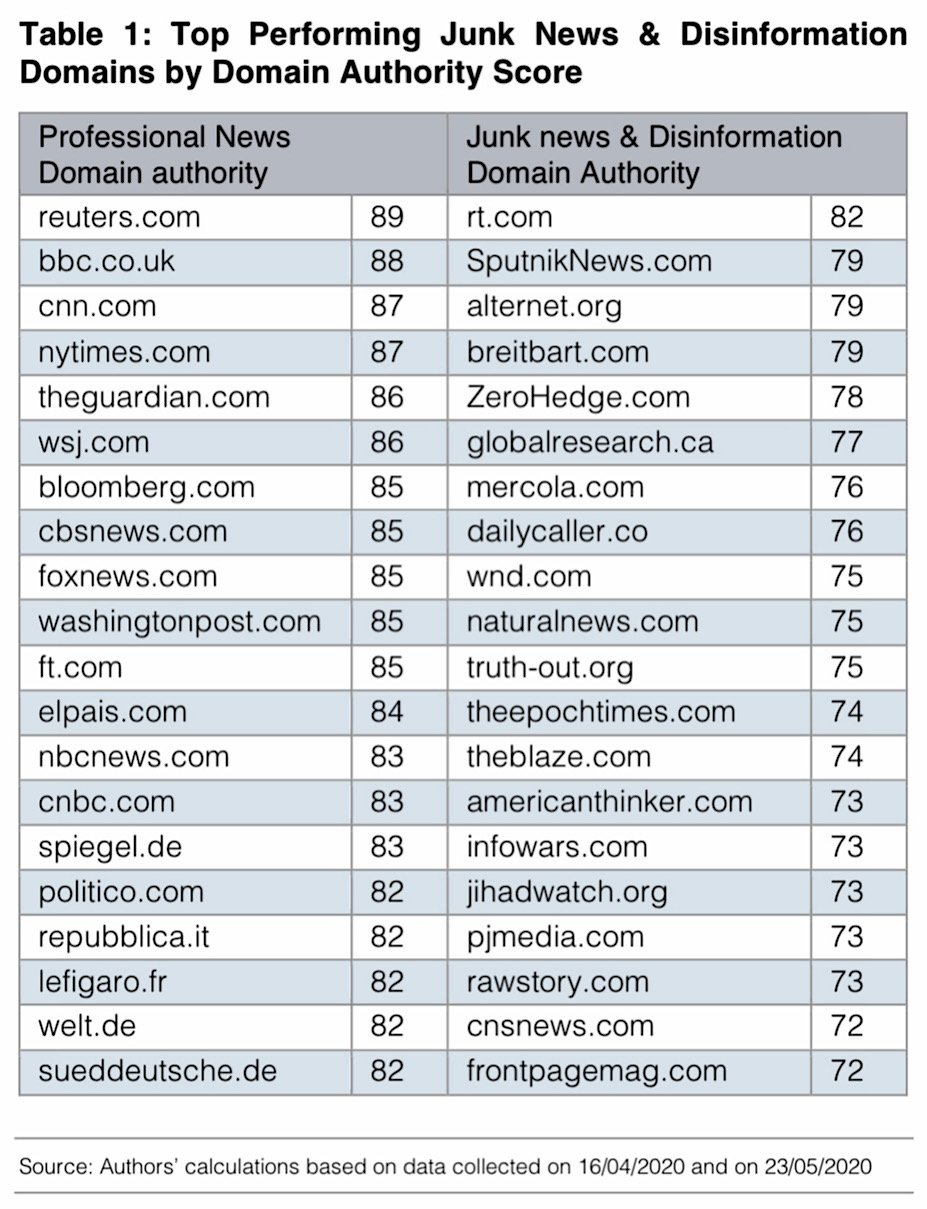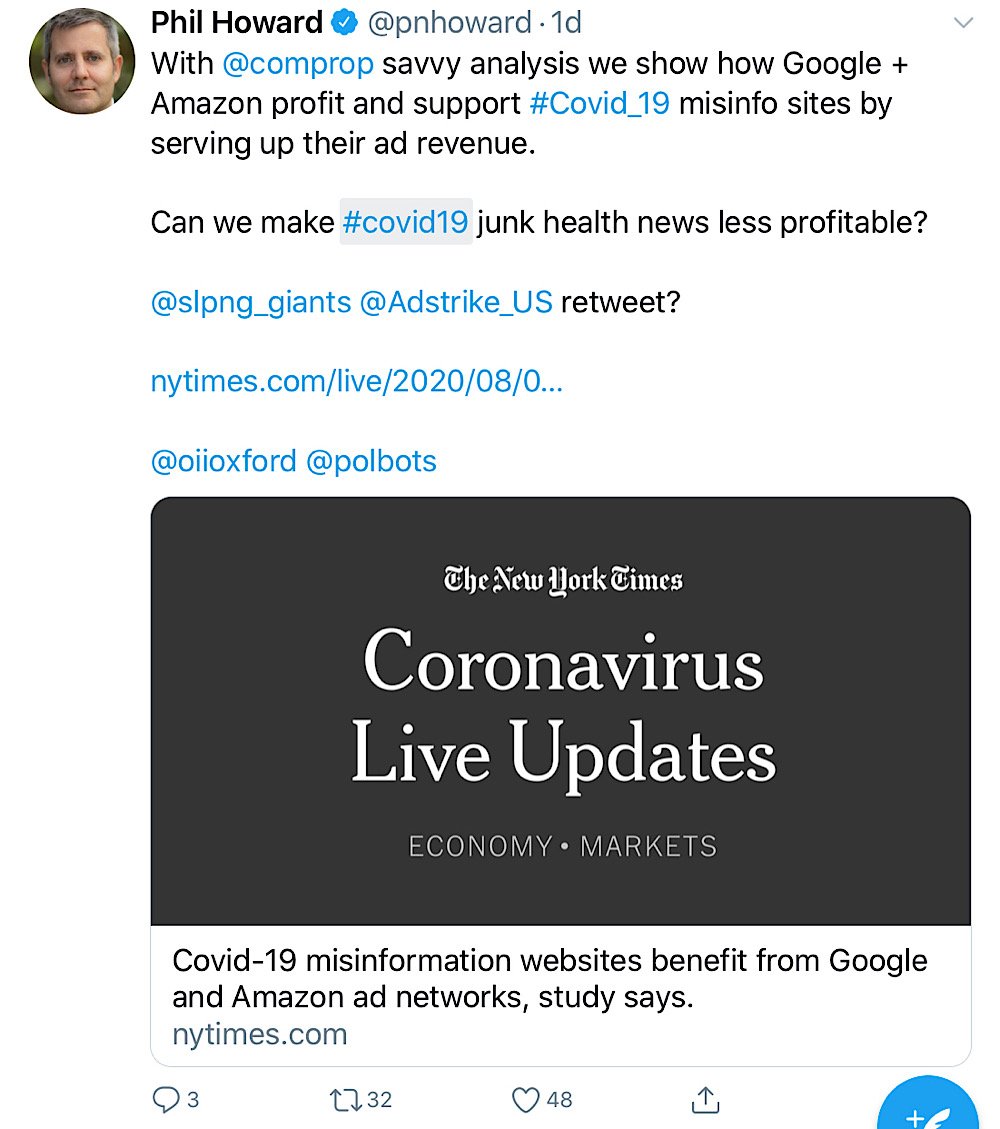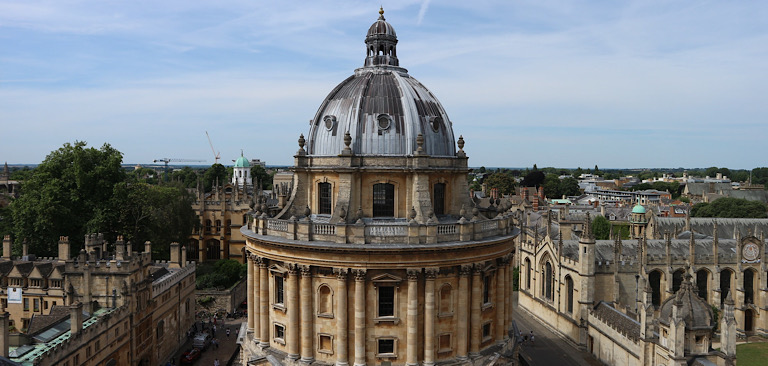The director of Oxford University’s Oxford Internet Institute, Philip Howard, has called for Amazon and Google to blacklist sites “with a history of sharing false and misleading information about the pandemic” from their ad programs – a move that would prevent them from monetizing via two of the world’s largest ad networks.
Howard made the comments in a New York Times article promoting a new paper from the Oxford Internet Institute that he co-wrote.
The paper brands Breitbart News, The Daily Caller, The Epoch Times, PJ Media, Zero Hedge, and other independent news outlets as “junk news and disinformation.”
Meanwhile, mainstream media outlets such as the BBC, CBS News, CNN, NBC News, The Guardian, The New York Times, and The Washington Post are classed as “professional news” in the paper.

Howard told The New York Times that it would be a “public service” to take down sites publishing “coronavirus-related misinformation” and said: “They are hucksters, fraudsters, peddling misinformation.”
The Oxford Internet Institute’s paper, which is titled “Follow the Money: How the Online Advertising Ecosystem Funds COVID-19 Junk News and Disinformation,” takes aim at search engines that are “directing traffic towards junk news & disinformation about COVID-19” and the way these sites “monetize that traffic through digital advertising.”
The paper also describes Zero Hedge’s Twitter ban and complains that the article which led to the ban “has remained online and is accessible through other platforms without restrictions”
However, the paper fails to mention that Zero Hedge’s Twitter account was subsequently reinstated with Twitter admitting it was wrong to ban the account.
Additionally, the paper claims that “the viral spread of digital junk news and disinformation” poses “grave risks to public safety” and accuses search engines and advertising platforms such as Amazon and Google of enabling and contributing to the success of “the ecosystem of junk news & disinformation around COVID-19.”
To support these claims, the paper includes a study of 830 sites that had published coronavirus content as recently as April 2020.
The paper divides these sites into two categories – professional news (which it describes as “major news brands, local news sources and new media and start-up publications which display the qualities of professional journalism, including transparency about real authors, editors, and owners and conduct fact-checking”) and junk news and disinformation (which it describes as sources that “failed on at least three out of five criteria: professionalism, style, credibility, bias, and counterfeit” or that were “flagged as false by factcheckers.”)
The researchers conducting the study then used the commercial search engine optimization (SEO) tool SEMrush and data from these sites to analyze how optimized their content is for distribution on search and social and how many of these sites rely on Amazon and Google for ad revenue.
Interestingly, the study acknowledges that seven of the professional news sources “were flagged by factcheckers for publishing at least one false story about COVID-19” but they were given a pass and removed from the data set “because professional news domains typically publish credible content, remove, retract and correct false information.”
And, one of the outlets deemed to be professional news in the study, CBS News, was infamously caught missatributing footage during a coronavirus segment when it used footage from an overrun Italian hospital while describing conditions in New York City.
In addition to calling for these sites to be blacklisted from ad networks, Howard also tagged Sleeping Giants – a pressure group that has previously attempted to get brands to pull their ads from Breitbart News.

And The New York Times also contacted Amazon and Google about the Oxford Internet Institute’s paper and Howard’s calls to blacklist these sites from their ad networks.
Related: ? Creators will have to move away from the ad-supported business model to avoid censorship
The paper and the subsequent mainstream media coverage is similar to the NBC News promotion of research from the pressure group Center for Countering Digital Hate (CCDH) earlier this year.
The CCDH research accused several sites, including The Federalist and Zero Hedge, of “profiting from articles pushing unsubstantiated claims about Black Lives Matter protests.” NBC News contacted Google about the research and it then threatened to ban The Federalist from its ad program. Zero Hedge appeared to have been already banned from the ad program when NBC News contacted Google.
While both sites are now running Google ads after complying with Google’s demands to place stricter restrictions on their comments sections, the incident demonstrated the potential these types of studies have to pressure the tech giants into stripping independent sites of their ability to earn ad revenue.












